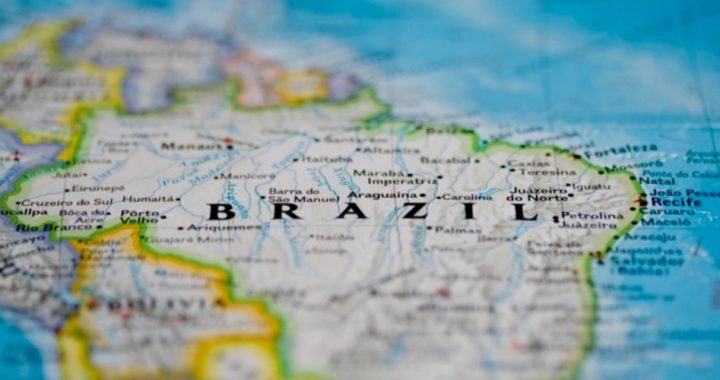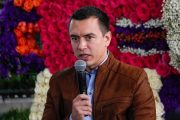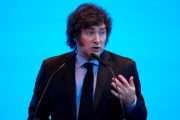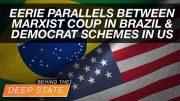
In a rare window into reality published by the establishment press, an explosive interview with a former U.S. ambassador appearing in the Miami Herald offered further confirmation of the largely behind-the-scenes machinations of a powerful network of socialist and communist forces working to foist tyranny on the peoples of Latin America. In contrast with the popular narrative of Brazil’s ruling political class as a “moderate” force, the ex-official also touched on the key role played by Brazilian President Dilma Rousseff of the Workers’ Party (PT) in the ongoing takeover of the region by a totalitarian-minded cabal.
The opinion piece, headlined “Why we spy on Brazil,” was written by Carlos Alberto Montaner, a prominent Cuban exile and university professor who has focused extensively on the ruthless communist dictatorship ruling over his homeland. He was even jailed as a “counter-revolutionary” after the takeover. While today the Castro regime is often portrayed as an isolated and crumbling relic of outdated totalitarianism, Montaner’s interview with the former ambassador confirmed once again — in a very public way; the link has been spread far and wide — that the truth is much more complicated.
The interview with the former American ambassador was presented in the context of alleged National Security Agency spying on foreign leaders — particularly Brazilian President Rousseff, a former communist guerilla whose e-mails were supposedly being monitored by the NSA. When asked why the U.S. government would be interested in keeping tabs on her, the U.S. ambassador, who asked not be named because it would cause “huge” problems for him, explained that Brazil’s current rulers are “not exactly friendly” from Washington’s perspective.
“By definition and history, Brazil is a friendly country that sided with us during World War II and Korea, but its present government is not,” the official noted, showing once again that the Rousseff’s “moderate” veneer is known to be phony even within the U.S. government. “All you have to do is read the records of the São Paulo Forum and observe the conduct of the Brazilian government.” With that one simple sentence, the Herald and the former ambassador shattered the deafening silence that surrounds one of the most important forces in the region: the Foro de São Paulo (FSP), or the São Paulo Forum in English.
While virtually unknown among the masses — especially in the United States, but even throughout Latin America — serious analysts say the FSP represents what is essentially the regional nucleus of the ongoing socialist and communist enslavement of Latin America. Founded by former Brazilian President Luis Inácio “Lula” da Silva with the PT, then-Communist Cuban tyrant Fidel Castro, the Sandinistas, assorted Marxist narco-terrorist groups, and others, the shadowy network now dominates the levers of power in most South and Central American nations — not to mention the dizzying regional patchwork of transnational “integration” schemes.
Today, it claims more than 100 political parties and organizations as participants, virtually all of them openly either socialist or communist. FSP-affiliated outfits currently control the national governments in Brazil, Bolivia, Cuba, Ecuador, El Salvador, Peru, Nicaragua, Uruguay, the Dominican Republic, Venezuela, and more. In other major countries — Chile, Mexico, Colombia, Costa Rica, and more — FSP parties represent the primary political opposition, not to mention armed terror groups like the Colombian FARC. Backed by European communists, the brutal dictatorship ruling mainland China, the Russian government, and other totalitarian-minded forces, the alliance’s influence continues to grow from the shadows.
Of course, plenty of establishment “experts” try to downplay the regional socialist takeover by referring to it as a “democratic” leftist movement with supposed broad popular support. The phenomenon, now obvious to almost everyone, is often minimized as a mere “pink tide,” too. A more appropriate descriptor might be something like a red tidal wave. Still, even PhD-sporting professors consistently misunderstand — or deliberately obfuscate — the facts surrounding what is happening in Latin America.
Countless supposed “analyses” by self-styled “experts” on the region even try to artificially divide the FSP-centered socialist movement into two non-existent camps: the “radical” totalitarians represented by the regimes ruling Venezuela, Cuba, Nicaragua, and others, versus the more “moderate” leftists ruling countries like Brazil, Argentina, or Uruguay. More than a few — Latin America boss Julia Sweig at the powerful U.S.-based Council on Foreign Relations, among others — almost certainly understand what is happening. Indeed, they are contributing to the autocratic machinations.
In the interview with the Herald, after briefly mentioning the FSP, the former U.S. ambassador lays it out. “The friends of Luis Inácio Lula da Silva, of Dilma Rousseff and the Workers Party are the enemies of the United States: Chavist Venezuela, first with (Hugo) Chávez and now with (Nicolás) Maduro; Raúl Castro’s Cuba; Iran; Evo Morales’ Bolivia; Libya at the time of Gadhafi; Bashar Assad’s Syria,” he explained. “In almost all conflicts, the Brazilian government agrees with the political lines of Russia and China…. Its more akin ideological family is that of the BRICS, with whom it tries to conciliate its foreign policy.”
Brazil’s PT rulers, the ex-ambassador noted, do not have or even pretend to have “the slightest desire to defend the democratic principles that are systematically violated in Cuba.” Instead, FSP co-founder and former Brazilian President Lula “often takes investors to the island to fortify the Castros’ dictatorship,” he added. “The money invested by the Brazilians in the development of the super-port of Mariel, near Havana, is estimated to be $1 billion.”
As numerous independent experts and analysts have also pointed out, the Castro regime, rather than being an isolated pariah in the region, is immensely influential. “Cuban influence in Brazil is covert but very intense,” the former U.S. ambassador explained, pointing out that Lula’s own chief of staff, José Dirceu, a.k.a. Carlos Henrique Gouveia, was an agent of the Communist Castro regime’s intelligence services. “Hand in hand with Lula,” the American official added, the ex-president’s chief of staff “placed Brazil among the major collaborators with the Cuban dictatorship.”
While the Lula’s right-hand man may have fallen into disgrace over corruption scandals, he “never retreated one inch from his ideological preferences and his complicity with Havana,” the ambassador noted. And it seems that nothing has changed. One of Rousseff’s key people is Professor Marco Aurelio Garcia, a founder of the PT who now serves as her “foreign policy advisor.” The ex-U.S. ambassador described him as “a contumacious anti-Yankee, worse than Dirceu even, because he’s more intelligent and had better training. He will do everything he can to foil the United States.”
Meanwhile, the Brazilian government and its foreign ministry, the former American diplomat explained, “simply ignores the election swindles perpetrated in Venezuela or Nicaragua” and “is totally indifferent to any abuses against freedom of the press.” As for other reasons why the U.S. government would have an interest in spying on Brazil’s leadership, the ambassador pointed to two issues in particular: drugs and corruption.
“Brazil is a notoriously corrupt country and those ugly practices affect the laws of the United States in two ways: when Brazilians utilize the American financial system and when they compete unfairly with U.S. companies by resorting to bribery or illegal commissions,” he said. “The issue of drugs is different. The production of Bolivian coca has multiplied fivefold since Evo Morales became president, and the outlet for that substance is Brazil. Almost all of it ends up in Europe, and our allies have asked us for information. That information sometimes is in the hands of Brazilian politicians.” That is well known, too — well-documented accusations of drug profits being used to finance the FSP’s political aims have been around for years.
Spying on radical statist leaders collaborating with terror-supporting anti-American despots and Marxist drug traffickers may well be a good idea — after all, that is what the massive U.S. “intelligence” bureaucracy was supposedly set up to do, not spy on hundreds of millions of innocent Americans. The U.S. ambassador, however, appears to gloss over some crucial information in the interview that helps paint a much clearer picture of what is really going on.
For one, instead of genuine concern about the “pink tide” in Latin America, the Obama administration and the broader U.S. establishment have been critical to its success — despite the occasional rhetoric. Consider, for example, the vast sums of American taxpayer cash funneled to Brazilian authorities and government-owned enterprises like Petrobras. Then there is the fact that the CFR and its affiliates, which admittedly dominate U.S. policymaking, have been crucial not only to the emergence of the Castro regime, among others, but to their perpetuation.
Prof. Olavo de Carvalho, an internationally acclaimed Brazilian author and philosopher who has played a key role in exposing the shadowy FSP network, told The New American that the outfit “would never have accumulated so much power if its activities had been denounced from the outset.” For over a decade and a half, though, big media and the establishment in Latin America and the United States have “refused to touch upon the subject, handing to the strategists of the communist revolution the protection of silence.” The CFR and the U.S. government, of course, have known all along.
Meanwhile, the official narrative surrounding the FSP and the so-called BRICS — the totalitarian-minded regimes ruling Brazil, Russia, India, China, and South Africa — portrays the autocratic alliances as being at odds with the Western establishment. Competition between them, people are led to believe, largely drives geopolitical events in today’s world. However, it is becoming increasingly clear that in reality, they all share similar visions — and are, ultimately, at the highest levels at least, on the same side.
BRICS bosses and Western leaders, for example, all promote what they refer to as a “New World Order.” The goals they describe of an empowered and benevolent United Nations — from U.S. presidents George H.W. Bush and Bill Clinton to deceased Venezuelan strongman Hugo Chavez and most recently the Communist Chinese dictatorship — are practically identical. Aside from liberty, prosperity, and national sovereignty, the innocent people of the United States and the world are the real victims. They are being played for fools, and without real change, it is only going to get worse.
Alex Newman, a foreign correspondent for The New American, is normally based in Europe after growing up in Latin America. He can be reached at [email protected].
Related articles:
Resurgent Communism in Latin America
Exposure of Radical CFR Latin America Boss Offers Broad Insight
With Dollar Demise in Focus, Beijing Pushes “New World Order”
Resurgent Communism in Latin America
Hillary Clinton Lets CFR Cat Out of the Bag
Communist Cuban Tyrant Raul Castro to Lead Latin American Bloc
South American Union Selects Socialist Leaders
New Americas Group Includes Cuba, Not U.S; China Cheers
Olavo de Carvalho on Communism in Latin America
Obama Commits American Support to Brazilian Oil
BRICS Regimes Forge New World Bank, Call for Global Currency
George Soros Touts China as Leader of New World Order
Kissinger Sings Convergence Theme With China’s “Red Song” Choir
World Bank Insider Blows Whistle on Corruption, Federal Reserve



